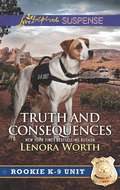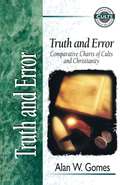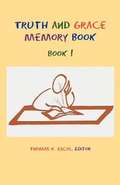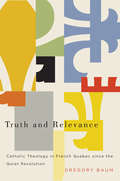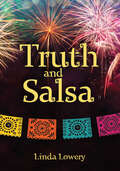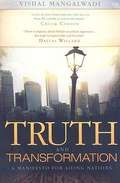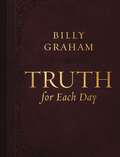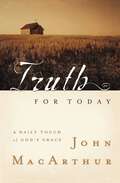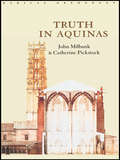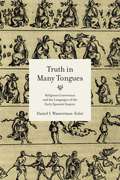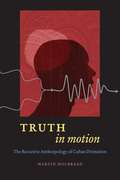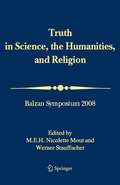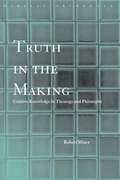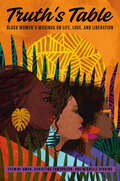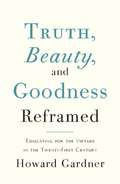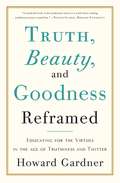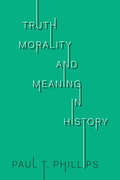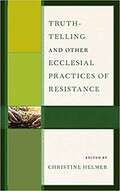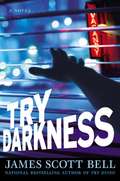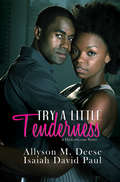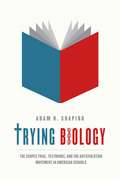- Table View
- List View
Truth Will Prevail (The Work and the Glory #3)
by Gerald N. LundTruth Will Prevail continues the gripping story of the fictional Steed family, a family acquainted with Joseph Smith and caught up in the grand events associated with the restoration of the Church of Jesus Christ to the earth. Covering the years 1836 to 1838, this volume finds the Steeds involved in both remarkable and turbulent events in Church history.
Truth and Consequences: Truth And Consequences Seaside Secrets Tactical Rescue (Rookie K-9 Unit #2)
by Lenora WorthTHE PROTECTOR'S MISSION Honoring a promise to a fallen comrade, former army medic David Evans heads to Arizona to check up on the soldier's sister. But as his train pulls into Desert Valley, David witnesses a drug run gone wrong and narrowly avoids the bullets flying his way. And when the police show up, he discovers the investigating officer is the woman he's supposed to look after. With a fiercely protective K-9 partner and a new badge, Whitney Godwin insists she can take care of herself and her infant daughter. But the criminals want both David and Whitney permanently silenced, so David will stop at nothing to protect the family he yearns to join. Rookie K-9 Unit: These lawmen solve the toughest cases with the help of their brave canine partners
Truth and Error: Comparative Charts of Cults and Christianity
by Alan W. GomesThis book is not only an introduction to the entire Zondervan Guide to Cults and Religious Movements series, but also a quick-reference guide to the groups and movements discussed in the series. Truth and Error brings together in one volume the charts from the various guides that show how the groups and movements differ theologically from historic orthodox Christianity. Each chart is introduced by the general editor, Alan Gomes. The books in the series that do not have comparison charts are introduced and summarized. Each book in the series includes - A concise introduction to the group or topic - An overview of the group's or movement's theology -- in their own words - A biblical response - Tips for witnessing effectively to members of the group - A bibliography with sources for further study -- Most books also include a comparison chart that shows the essential differences between biblical Christianity and the group. The charts from these books are reproduced in Truth & Error.
Truth and Grace Memory Book (Medieval Mysteries #1)
by Thomas K. AscolThe book presents Scripture memory, exposure to great hymns and catechetical instruction.
Truth and Method
by Hans Georg GadamerA study and investigation that deals with the problem of hermeneutics--- the understanding and interpretation of the Bible and other literary texts arguing that the phenomenon is not a human science or method but the human experience of the world.
Truth and Relevance: Catholic Theology in French Quebec since the Quiet Revolution
by Gregory BaumAfter the Quiet Revolution, the Catholic church lost its stronghold in Quebec. Despite this decline, or perhaps because of it, contemporary Catholic thought in Quebec exhibits a bold creativity. In Truth and Relevance, Gregory Baum introduces, contextualizes, and interprets Catholic theological writing in Quebec since the 1960s, and presents this body of work for an anglophone readership. Baum shows how Catholic theologians, inspired by the Second Vatican Council (1962-65), uncovered the social meaning in the Christian message, allowing them to address many problems and concerns of contemporary society. With reliance on the Gospel, they supported Quebec's new self-understanding, embraced its nationalism under certain conditions, fostered social solidarity, criticized the unregulated market system, demanded gender equality, and called for respect of new religious and cultural pluralism. Leaving behind the Catholicism of Quebec's past, these theologians embraced the humanistic values of modern society, recognizing their affinity with the Gospel, while at the same time revealing the destructive potential of modernity, its individualism, utilitarianism, relativism, and its link to empire and capitalism. Weaving together theological and sociological reflections, Truth and Relevance is a fascinating account of modernity, secularism, and the evolution of the Catholic church in Quebec.
Truth and Salsa
by Linda LoweryA spirited young girl must travel far from home to finally find herself.Mexico is a long way from Kalamazoo—and not just in terms of miles. Almost-thirteen-year-old Hayley Flynn is spending six months with her eccentric grandmother in the rural mountain town of San Miguel while her recently separated parents work things out. For Hayley, life in Mexico is surprisingly exciting—exotic birds, beautiful butterflies, holidays, colorful fiestas, and new friends like Lili.But there are also difficult lessons to be learned. Poverty and unemployment send Lili's father and other men from the village to work in Michigan, sending money back home to their anxious families. Meanwhile, Hayley is on the lookout for la fantasma (the ghost) that is said to haunt her grandma's house.Linda Lowery creates an affectionate portrait of a small town in Mexico and its people in this warm, humorous story of self-discovery. With a captivating plot and relatable protagonist, readers will be engaged on every page.
Truth and Transformation: A Manifesto for Ailing Nations
by Vishal MangalwadiWe live in times marked by much confusion and apprehension. In this landmark book, international scholar and author Vishal Mangalwadi offers a radical vision for the gospel's power to heal Western society. With insights drawn from real-life struggles against corruption and years of study, he delves into the ideological roots of social oppression. Reform, he argues, is never without controversy. Yet, reforming a culture's values is a necessary precursor to lasting liberation and hope. <P><P>Features:In-depth analysis of worldviews and cultural trends Specific information on becoming involved in transforming cultureA fresh, non-Western look at Scripture <P><P>About the author <P><P>Vishal Mangalwadi (1949-) MA, LLD, is an international lecturer, social reformer, political columnist, and author of thirteen books. Born and raised in India, he studied philosophy at universities, in Hindu ashrams, and at L'Abri Fellowship in Switzerland. In 1976 he turned down several job offers in the West to return to India, where he and his wife, Ruth, founded a community to serve the rural poor. Vishal continued his involvement in community development serving at the headquarters of two national political parties, where he worked for the empowerment and liberation of peasants and the lower castes. In demand worldwide, Vishal is a dynamic, engaging speaker who has lectured in 32 countries. He enjoys simplifying complex ideas and inspiring despairing hearts with hope.
Truth for Each Day: A 365-Day Devotional
by Billy GrahamWhen the world around you feels chaotic and hard to navigate, you can be reminded of the unchanging truth of the Bible in this 365-day devotional from beloved evangelist Billy Graham.Truth for Each Day gives you a full year of hopeful reminders and grounded messages to encourage you to live and walk in God's truth. Each passage invites you to meditate on the unchanging Word of God and includes a thoughtful message from Mr. Graham to give you daily encouragement.This year-long devotional features a larger size and more readable print, a leathersoft cover, and a ribbon marker, making it a beautiful gift book for all ages. Longtime fans of Graham's ministry and books will appreciate this collection of writings, as will newcomers who are encountering his words for the first time.If you find yourself in a place where truth is hard to find, Truth for Each Day will remind you of the foundational need for the Gospel and its powerful hope for your life.
Truth for Today: A Daily Touch of God's Grace
by John F. MacArthurLong respected as one of today's most knowledgeable Bible teachers, John MacArthur has never had a book that offers his insights in such an easily accessible manner. Be prepared to be encouraged, challenged, energized, and changed as MacArthur offers seasoned wisdom on different passages of Scripture. Perfect for daily readings, this unique gift book is destined to be a treasured classic for years to come.
Truth in Aquinas (Routledge Radical Orthodoxy)
by John Milbank Catherine PickstockProvocative and sophisticated, Truth in Aquinas is a fascinating re-evaluation of a key area - truth - in the work of Thomas Aquinas. John Milbank and Catherine Pickstock's provocative but strongly argued position is that many of the received views of Aquinas as philosopher and theologian are wrong.This compelling and controversial work builds on the amazing reception of Radical Orthodoxy (Routledge, 1999).
Truth in Many Tongues: Religious Conversion and the Languages of the Early Spanish Empire
by Daniel I. Wasserman-SolerTruth in Many Tongues examines how the Spanish monarchy managed an empire of unprecedented linguistic diversity. Considering policies and strategies exerted within the Iberian Peninsula and the New World during the sixteenth century, this book challenges the assumption that the pervasiveness of the Spanish language resulted from deliberate linguistic colonization.Daniel I. Wasserman-Soler investigates the subtle and surprising ways that Spanish monarchs and churchmen thought about language. Drawing from inquisition reports and letters; royal and ecclesiastical correspondence; records of church assemblies, councils, and synods; and printed books in a variety of genres and languages, he shows that Church and Crown officials had no single, unified policy either for Castilian or for other languages. They restricted Arabic in some contexts but not in others. They advocated using Amerindian languages, though not in all cases. And they thought about language in ways that modern categories cannot explain: they were neither liberal nor conservative, neither tolerant nor intolerant. In fact, Wasserman-Soler argues, they did not think predominantly in terms of accommodation or assimilation, categories that are common in contemporary scholarship on religious missions. Rather, their actions reveal a highly practical mentality, as they considered each context carefully before deciding what would bring more souls into the Catholic Church.Based upon original sources from more than thirty libraries and archives in Spain, Italy, the United States, England, and Mexico, Truth in Many Tongues will fascinate students and scholars who specialize in early modern Spain, colonial Latin America, Christian-Muslim relations, and early modern Catholicism.
Truth in Many Tongues: Religious Conversion and the Languages of the Early Spanish Empire (G - Reference,information And Interdisciplinary Subjects Ser.)
by Daniel I. Wasserman-SolerTruth in Many Tongues examines how the Spanish monarchy managed an empire of unprecedented linguistic diversity. Considering policies and strategies exerted within the Iberian Peninsula and the New World during the sixteenth century, this book challenges the assumption that the pervasiveness of the Spanish language resulted from deliberate linguistic colonization.Daniel I. Wasserman-Soler investigates the subtle and surprising ways that Spanish monarchs and churchmen thought about language. Drawing from inquisition reports and letters; royal and ecclesiastical correspondence; records of church assemblies, councils, and synods; and printed books in a variety of genres and languages, he shows that Church and Crown officials had no single, unified policy either for Castilian or for other languages. They restricted Arabic in some contexts but not in others. They advocated using Amerindian languages, though not in all cases. And they thought about language in ways that modern categories cannot explain: they were neither liberal nor conservative, neither tolerant nor intolerant. In fact, Wasserman-Soler argues, they did not think predominantly in terms of accommodation or assimilation, categories that are common in contemporary scholarship on religious missions. Rather, their actions reveal a highly practical mentality, as they considered each context carefully before deciding what would bring more souls into the Catholic Church.Based upon original sources from more than thirty libraries and archives in Spain, Italy, the United States, England, and Mexico, Truth in Many Tongues will fascinate students and scholars who specialize in early modern Spain, colonial Latin America, Christian-Muslim relations, and early modern Catholicism.
Truth in Motion: The Recursive Anthropology of Cuban Divination
by Martin HolbraadEmbarking on an ethnographic journey to the inner barrios of Havana among practitioners of Ifá, a prestigious Afro-Cuban tradition of divination, Truth in Motion reevaluates Western ideas about truth in light of the practices and ideas of a wildly different, and highly respected, model. Acutely focusing on Ifá, Martin Holbraad takes the reader inside consultations, initiations, and lively public debates to show how Ifá practitioners see truth as something to be not so much represented, as transformed. Bringing his findings to bear on the discipline of anthropology itself, he recasts the very idea of truth as a matter not only of epistemological divergence but also of ontological difference--the question of truth, he argues, is not simply about how things may appear differently to people, but also about the different ways of imagining what those things are. By delving so deeply into Ifá practices, Truth in Motion offers cogent new ways of thinking about otherness and how anthropology can navigate it.
Truth in Science, the Humanities and Religion
by International Balzan FoundationThe question of the meaning of "truth" is central to many areas of contemporary debate, whether between those subscribing to a post-Enlightenment view of the world and those who seek fundamental truth in religious texts, or between those maintaining that there are absolute truths and those believing facts to be social constructs. For some, the ultimate truth is revealed through religious faith and textual authority. Can this view be reconciled with an evidence-based, materialist, post-Enlightenment perspective of the truth as embraced by the natural sciences? If religion holds the key to the truth, which religion and which truths? What is the attitude of the humanities to the meaning of truth? Truth in the sciences and the humanities as well as in religion and theology is the central theme of this book based on the proceedings of a conference organized by the International Balzan Foundation. It contains the speakers' lectures, the corresponding reactions of the invited panel members as well as the general discussions. The reader can familiarize himself with views ranging from philosophy to religion, from mathematics, physics and cosmology to biological sciences, history, sociology and economics. The exceptional wide scope of the book, comprising arguments about truth in the sciences, the humanities as well as religion and theology together with the discussions between representatives of all these different fields, means that it is of interest to a professional as well as a general readership.
Truth in the Making: Creative Knowledge in Theology and Philosophy (Routledge Radical Orthodoxy)
by Robert C. MinerIs knowing a purely passive reception of something concrete outside the mind, or when we know something, are we creating something too?Spanning more than 500 years of philosophical enquiry from the Middle Ages to the present day, Robert Miner clarifies modern philosophical conceptions of knowing as making or constructing, and contrasts this view with the theological understanding of knowing as a participation in divine creation.This study demonstrates how 'creative knowledge' has its roots in the theologies of Thomas Aquinas and Nicholas Cusanus. It explores the multiple ways in which this idea influenced the architects of modern philosophy, most notably Francis Bacon, René Descartes and Thomas Hobbes, despite their secular stance. Miner contends that, well in advance of Kant, one of these thinkers, Gaimbattista Vico provided a remarkably succinct formulation of the metaphysical and epistemological core of modernity in his principle verum et factum convertuntur: 'the true and the made are convertible'.In Truth in the Making, Robert Miner challenges the standard assumption that Kant was the first thinker to conceive of knowing as constructive activity, and shows how contemporary theology can reclaim a concept of knowing that is both creative and participant in divine wisdom.
Truth's Table: Black Women's Musings on Life, Love, and Liberation
by Michelle Higgins Ekemini Uwan Christina EdmondsonA collection of essays and stories documenting the lived theology and spirituality we need to hear in order to lean into a more freeing, loving, and liberating faith—from the hosts of the beloved Truth&’s Table podcast&“The liberating work of Truth&’s Table creates breathing room to finally have those conversations we&’ve been needing to have.&”—Morgan Harper Nichols, artist and poet Once upon a time, an activist, a theologian, and a psychologist walked into a group chat. Everything was laid out on the table: Dating. Politics. The Black church. Pop culture. Soon, other Black women began pulling up chairs to gather round. And so, the Truth&’s Table podcast was born.In their literary debut, co-hosts Christina Edmondson, Michelle Higgins, and Ekemini Uwan offer stories by Black women and for Black women examining theology, politics, race, culture, and gender matters through a Christian lens. For anyone seeking to explore the spiritual dimensions of hot-button issues within the church, or anyone thirsty to deepen their faith, Truth&’s Table provides exactly the survival guide we need, including: • Michelle Higgins&’s unforgettable treatise revealing the way &“racial reconciliation&” is a spiritually bankrupt, empty promise that can often drain us of the ability to do real justice work• Ekemini Uwan&’s exploration of Blackness as the image of God in the past, present, and future• Christina Edmondson&’s reimagination of what a more just and liberating form of church discipline might look like—one that acknowledges and speaks to the trauma in the room These essays deliver a compelling theological re-education and pair the spiritual formation and political education necessary for Black women of faith.
Truth, Beauty, and Goodness Reframed
by Howard GardnerFrom ancient times, philosophers, theologians, and artists have attempted to describe and categorize the defining virtues of civilization. InTruth, Beauty, and Goodness Reframed, renowned education authority Howard Gardner explores the meaning of the title's three virtues in an age when vast technological advancement and relativistic attitudes toward human nature have deeply shaken our moral worldview. His incisive examination reveals that although these concepts are changing faster than ever before, they are--and will remain, with our stewardship--cornerstones of our society. Designed to appeal to a wide readership,Truth, Beauty, and Goodness Reframedis an approachable primer on the foundations of ethics in the modern age.
Truth, Beauty, and Goodness Reframed: Educating for the Virtues in the Age of Truthiness and Twitter
by Howard GardnerFrom one of the world's most influential public intellectuals, an elucidating primer on the foundations of ethics and virtue in the modern age.
Truth, Reality, and Meaning in History (UTP Insights)
by Paul T. PhillipsIn this important new book, Paul T. Phillips argues that most professional historians – aside from a relatively small number devoted to theory and methodology – have concerned themselves with particular, specialized areas of research, thereby ignoring the fundamental questions of truth, morality, and meaning. This is less so in the thriving general community of history enthusiasts beyond academia, and may explain, in part at least, history’s sharp decline as a subject of choice by students in recent years. Phillips sees great dangers resulting from the thinking of extreme relativists and postmodernists on the futility of attaining historical truth, especially in the age of "post-truth." He also believes that moral judgment and the search for meaning in history should be considered part of the discipline’s mandate. In each section of this study, Phillips outlines the nature of individual issues and past efforts to address them, including approaches derived from other disciplines. This book is a call to action for all those engaged in the study of history to direct more attention to the fundamental questions of truth, morality, and meaning.
Truth-Telling and Other Ecclesial Practices of Resistance
by Christine Helmer Paul R. Hinlicky Jan-Olav Henriksen Craig L. Nessan Amy Carr Allen G. Jorgenson Cheryl M. Peterson Timothy L. Seals Gordon J. Straw Man-Hei YipIn this book, leading American Lutheran theologians, inspired by the Scandinavian emphasis on theology as embodied practice, ask how Christian communities might be mobilized for resistance against systemic injustices. They argue that the challenges we confront today as citizens of the United States, as a species in relation to all the other species on the planet, and as members of the body of Christ require an imaginative reconceptualization of the inherited tradition. <p><p> The driving force of each chapter is the commitment to truth-telling in naming the church’s complicity with social and political evils, and to reorienting the church to the truth of grace that Christianity was created to communicate. Contributors ask how ecclesial resources may be generatively repurposed for the church in the world today, for church-building grounded in Christ and for empowering the church’s witness for justice. <p><p> The authors take up the theme of resistance in both theoretical and pragmatic terms, on the one hand, rethinking doctrine, on the other, reconceiving lived religion and pastoral care, in light of the necessary urgencies of the time, and bearing witness to the God whose truth includes both justice and hope.
Try Darkness (Ty Buchanan, Book #2)
by James Scott BellTy Buchanan is living on the peaceful grounds of St. Monica's, far away from the glamorous life he led as a rising trial lawyer for a big L.A. firm. Recovering from the death of his fiance, and a false accusation of murder, Buchanan has found his previous ambitions unrewarding. Now he prefers offering legal services to the poor and the underrepresented from his "office" at local coffee bar The Ultimate Sip. With his new friends, the philosophizing Father Bob and basketball-playing Sister Mary Veritas, Buchanan has found a new family of sorts. One of his first clients is a mysterious woman who arrives with her six-year-old daughter. They are being illegally evicted from a downtown transient hotel, an interest that Ty soon discovers is represented by his old law firm and his former best friend, Al Bradshaw. Buchanan won't back down. He's going to fight for the woman's rights. But then she ends up dead, and the case moves from the courtroom to the streets. Determined to find the killer and protect the little girl, who has no last name and no other family, Buchanan finds he must defend on skills he never needed in the employ of a civil law firm. The trial leads Buchanan trough the sordid underbelly of the city and to the mansions and yachts of the rich and famous. No one is anxious to talk. But somebody wants Buchanan to shut up. For Good. Now he must use every legal and physical edge he knows to keep himself and the girl alive.
Try a Little Tenderness: A Hislove.com Novel
by Isaiah David Paul Allyson M. DeeseHusband and wife Isaiah David Paul and Allyson M. Deese team up to bring a street-themed Christian romance to life.Amirah Dalton has accepted her calling to be in outreach ministry at her local church. The only problem is that she's the only unwed female in leadership, and she feels the pressure to find a husband--fast. After serving time in prison for larceny and mail fraud, Mateo Valdez joins the newly formed Street Disciples Ministry in Asheville, North Carolina in an effort to atone for his sins and spread the word of Christ. Amirah and Mateo both join His-Love.com in an effort to meet someone of the opposite sex willing to give them a chance. Will they listen to God and connect, or will they let Satan allow their perceptions of one another get in the way?
Trying Biology: The Scopes Trial, Textbooks, and the Antievolution Movement in American Schools
by Adam R. ShapiroIn Trying Biology, Adam R. Shapiro convincingly dispels many conventional assumptions about the 1925 Scopes "monkey" trial. Most view it as an event driven primarily by a conflict between science and religion. Countering this, Shapiro shows the importance of timing: the Scopes trial occurred at a crucial moment in the history of biology textbook publishing, education reform in Tennessee, and progressive school reform across the country. He places the trial in this broad context--alongside American Protestant antievolution sentiment--and in doing so sheds new light on the trial and the historical relationship of science and religion in America. For the first time we see how religious objections to evolution became a prevailing concern to the American textbook industry even before the Scopes trial began. Shapiro explores both the development of biology textbooks leading up to the trial and the ways in which the textbook industry created new books and presented them as "responses" to the trial. Today, the controversy continues over textbook warning labels, making Shapiro's study--particularly as it plays out in one of America's most famous trials--an original contribution to a timely discussion.
Trying Biology: The Scopes Trial, Textbooks, and the Antievolution Movement in American Schools
by Adam R. ShapiroIn Trying Biology, Adam R. Shapiro convincingly dispels many conventional assumptions about the 1925 Scopes “monkey” trial. Most view it as an event driven primarily by a conflict between science and religion. Countering this, Shapiro shows the importance of timing: the Scopes trial occurred at a crucial moment in the history of biology textbook publishing, education reform in Tennessee, and progressive school reform across the country. He places the trial in this broad context—alongside American Protestant antievolution sentiment—and in doing so sheds new light on the trial and the historical relationship of science and religion in America. For the first time we see how religious objections to evolution became a prevailing concern to the American textbook industry even before the Scopes trial began. Shapiro explores both the development of biology textbooks leading up to the trial and the ways in which the textbook industry created new books and presented them as “responses” to the trial. Today, the controversy continues over textbook warning labels, making Shapiro’s study—particularly as it plays out in one of America’s most famous trials—an original contribution to a timely discussion.

